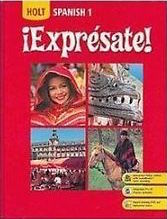
All Solutions
Page 184: Preparate para el examen
2.) Mi abuelo tiene 70 años. Siempre me gusta pasar tiempo con él porque es muy inteligente y me gusta eschuchar sus cuentos. Le gusta leer mucho y siempre pasa su tiempo con un libro en el salón.
3.) Mis padres son mis modelos a seguir. Tienen un matrimonio feliz, buenos trabajos, una familia grande y unida. Mi padre tiene el pelo marrón y tiene 50 años. Mi madre tiene el pelo largo y le gusta cuidar las plantas que tenemos en casa.
4.) Mi gato es muy esponjoso. Le gusta que le abrazamos y le gusta atención. Es blanco y marrón.
Empezamos
Vuelve
Mis
Volvemos
Almorzamos
Juegan
Juego
Mis
Merendar
Lavar los platos – wash the dishes
Sacar la basura – throw the trash
Limpiar el baño – clean the bathroom
Pasar la aspiradora – vacuum
Cocinar – cook
Cortar el césped – mow the lawn
Cuidar a mis hermanos – watch my siblings
Yo casi siempre lavo los platos.
Yo casi nunca saco la basura, mi novio siempre saca la basura.
Yo siempre limpio el baño.
Yo a veces paso la aspiradora, normalmente mi padre pasa la aspiradora.
Yo casi siempre cocino, a veces lo hace mi novio.
Yo nunca corto el césped, mi padre siempre corta el césped.
Yo nunca cuido a mis hermanos, mi padre siempre lo hace.
Están
Parece
Nunca
Tampoco
2.) La palabra „familia“ se refiere a toda la familia, también la familia extendida.
3.) la cultura y las diferencias de la clima tienen mucha influencia en la arquitectura de los países. Por ejemplo, en Chile las casas tiene influencia alemana y británica. También se puede ver la necesidad de protejerse de los fríos. En las Amazonas, las casas se construyen muy alto para protección.
Below is just an example of how the conversation should look like.
COMPAÑERO B: Sí, claro, a veces tengo que lavar los platos y normalmente corto el césped y limpio el baño. ¿Cuáles quehaceres hace tu hermano ?
COMPAÑERO A: Mi hermano limpia los baños y arregla las cosas en casa. Yo tengo que limpiar mi cuarto. Él no hace mucho. Es muy injusto.
COMPAÑERO B: Pero tu hermano hace mucho, no sé por qué te quejas. ¿Por qué piensas que es injusto?
COMPAÑERO A: Porque mi madre limpia el cuarto de mi hermano, pero no el mío.
COMPAÑERO B: Me parece justo. ¿Quieres hacer los quehaceres de tu hermano?
COMPAÑERO A: No. ¿Y cuáles quehaceres hace tu hermano?
COMPAÑERO B: Él no hace nada porque tienes dos años.

